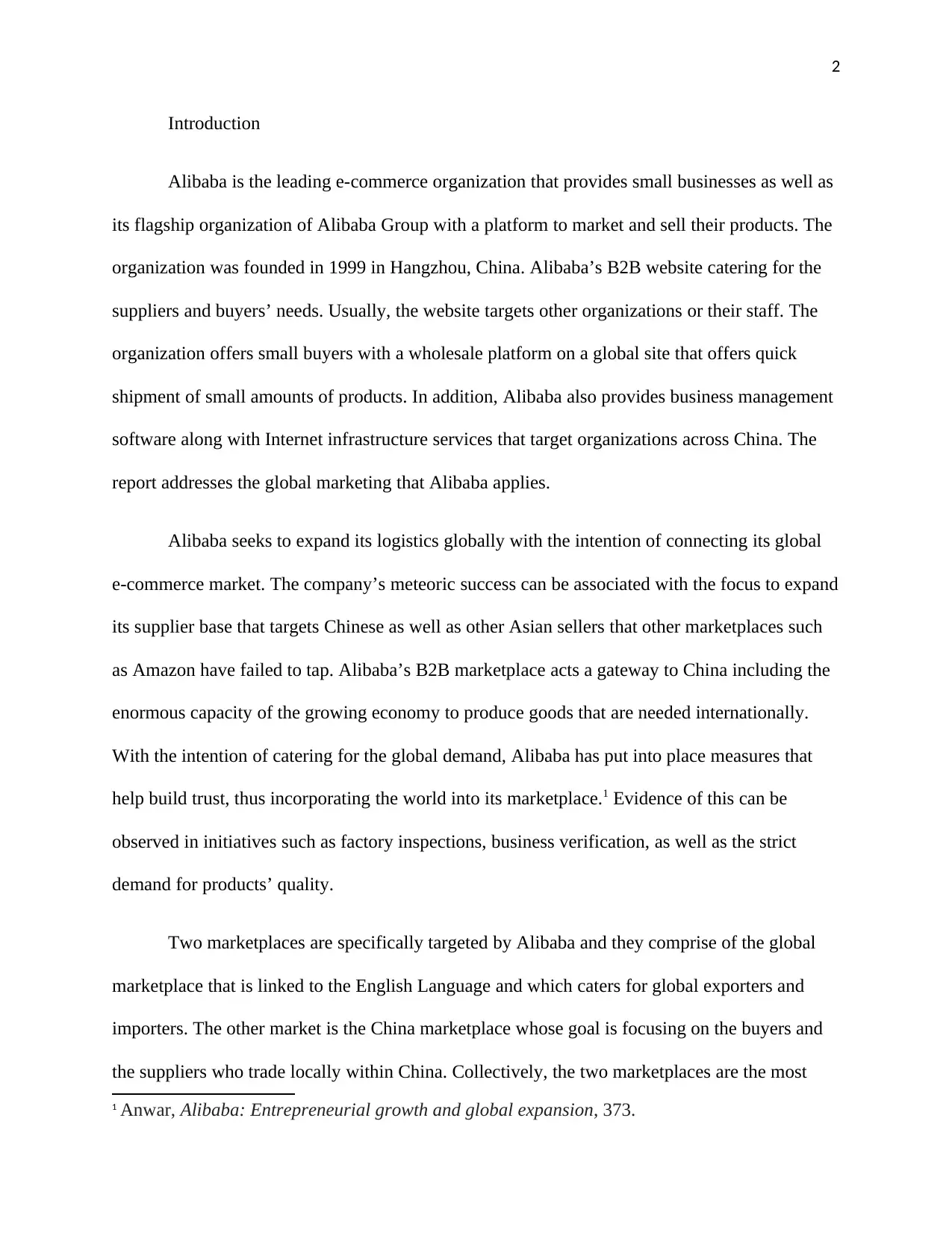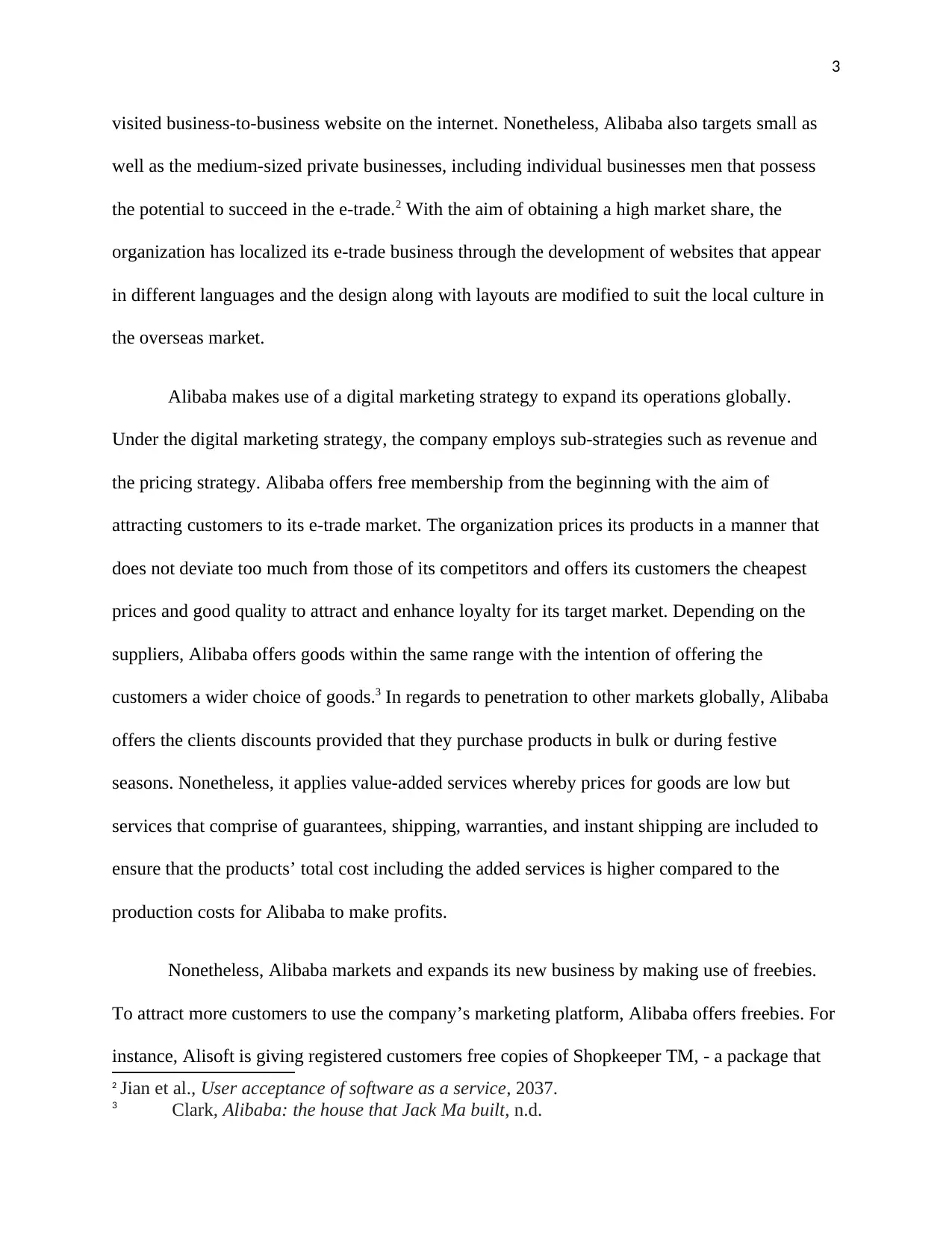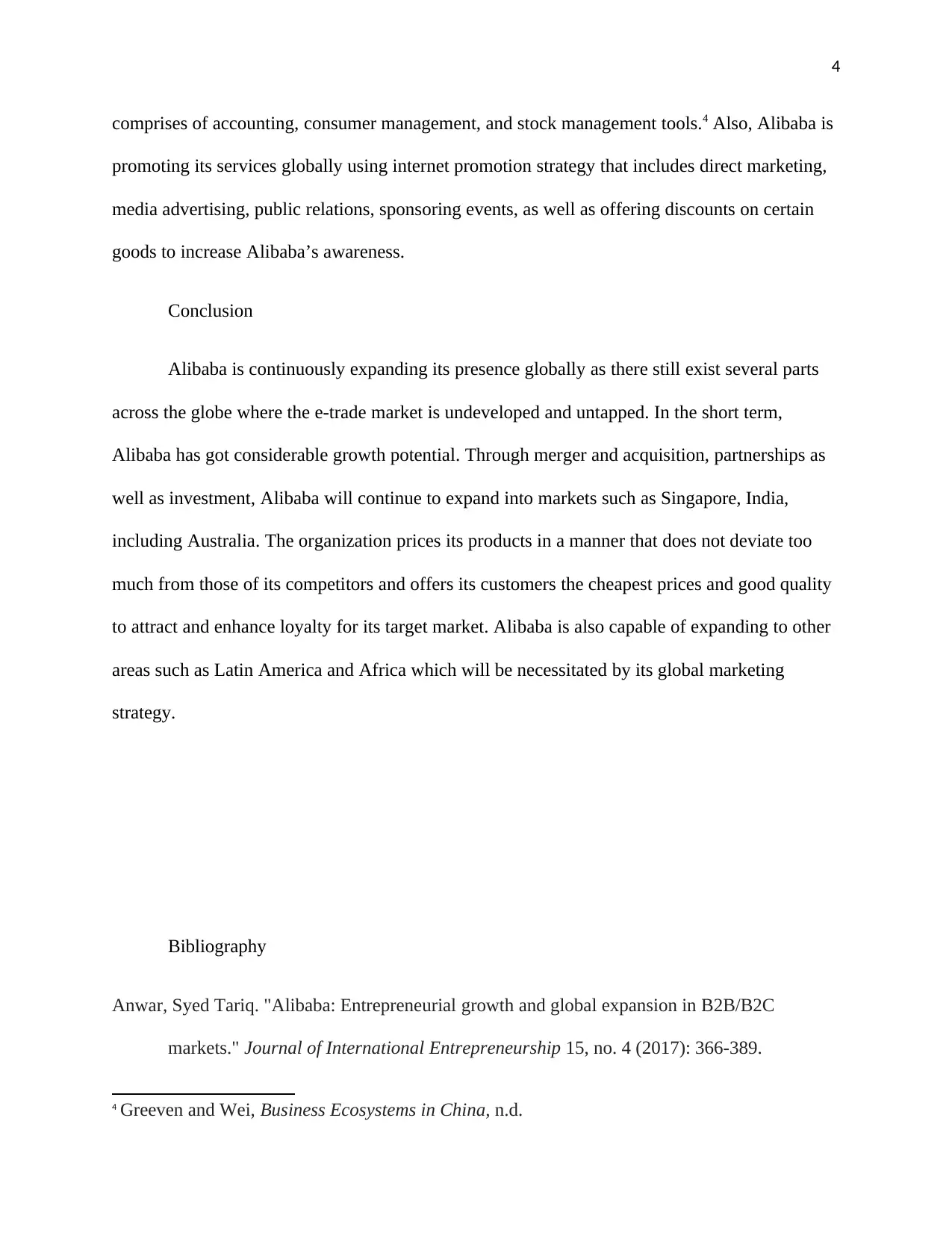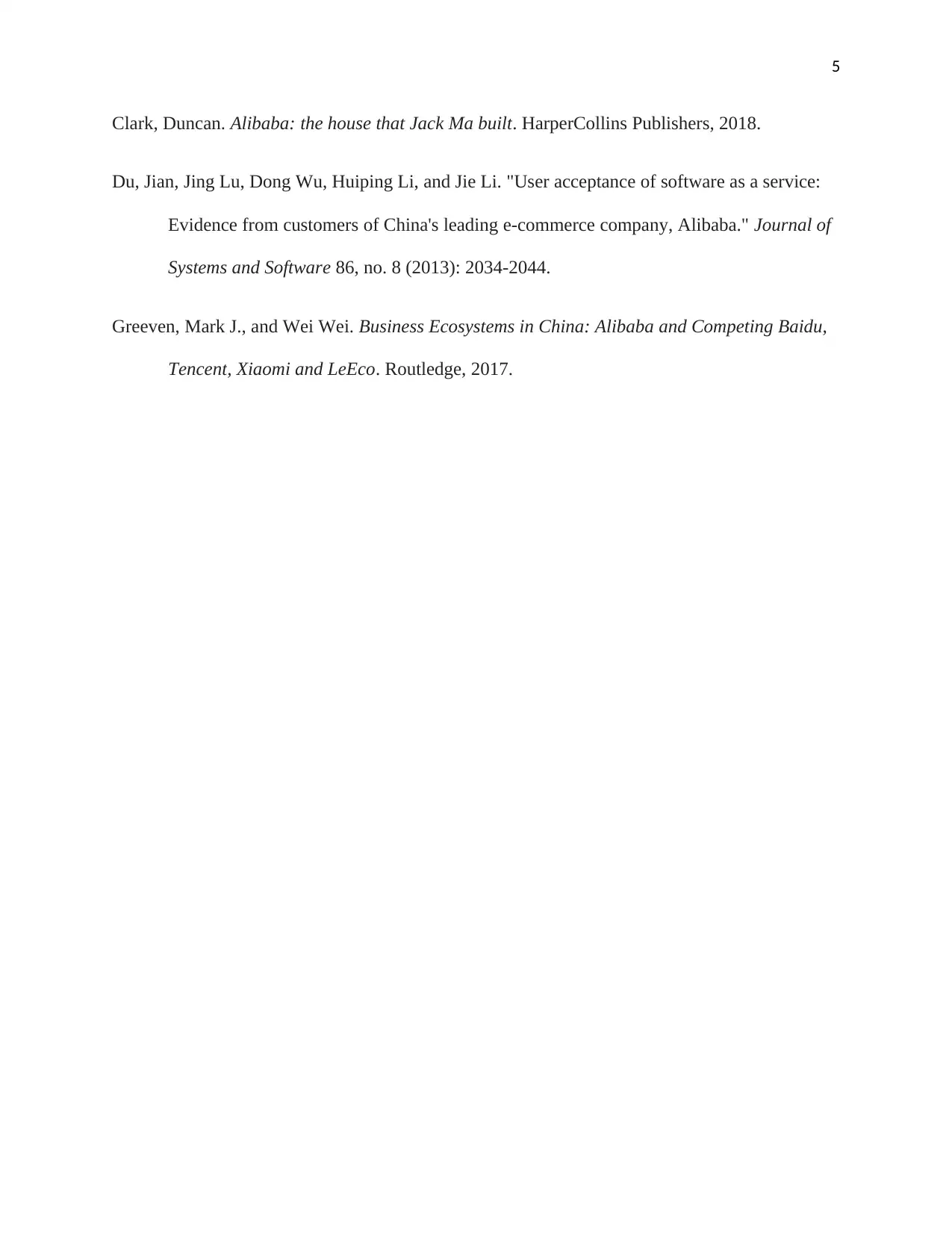Global Marketing: Expanding Alibaba's Presence Globally
VerifiedAdded on 2023/01/18
|5
|1015
|97
AI Summary
This article discusses Alibaba's global marketing strategy and its efforts to expand its presence globally. It explores the use of digital marketing, pricing strategy, and freebies to attract customers. The article also highlights Alibaba's focus on building trust and incorporating the world into its marketplace.
Contribute Materials
Your contribution can guide someone’s learning journey. Share your
documents today.

1
Global Marketing
Name
Course
Date
Global Marketing
Name
Course
Date
Secure Best Marks with AI Grader
Need help grading? Try our AI Grader for instant feedback on your assignments.

2
Introduction
Alibaba is the leading e-commerce organization that provides small businesses as well as
its flagship organization of Alibaba Group with a platform to market and sell their products. The
organization was founded in 1999 in Hangzhou, China. Alibaba’s B2B website catering for the
suppliers and buyers’ needs. Usually, the website targets other organizations or their staff. The
organization offers small buyers with a wholesale platform on a global site that offers quick
shipment of small amounts of products. In addition, Alibaba also provides business management
software along with Internet infrastructure services that target organizations across China. The
report addresses the global marketing that Alibaba applies.
Alibaba seeks to expand its logistics globally with the intention of connecting its global
e-commerce market. The company’s meteoric success can be associated with the focus to expand
its supplier base that targets Chinese as well as other Asian sellers that other marketplaces such
as Amazon have failed to tap. Alibaba’s B2B marketplace acts a gateway to China including the
enormous capacity of the growing economy to produce goods that are needed internationally.
With the intention of catering for the global demand, Alibaba has put into place measures that
help build trust, thus incorporating the world into its marketplace.1 Evidence of this can be
observed in initiatives such as factory inspections, business verification, as well as the strict
demand for products’ quality.
Two marketplaces are specifically targeted by Alibaba and they comprise of the global
marketplace that is linked to the English Language and which caters for global exporters and
importers. The other market is the China marketplace whose goal is focusing on the buyers and
the suppliers who trade locally within China. Collectively, the two marketplaces are the most
1 Anwar, Alibaba: Entrepreneurial growth and global expansion, 373.
Introduction
Alibaba is the leading e-commerce organization that provides small businesses as well as
its flagship organization of Alibaba Group with a platform to market and sell their products. The
organization was founded in 1999 in Hangzhou, China. Alibaba’s B2B website catering for the
suppliers and buyers’ needs. Usually, the website targets other organizations or their staff. The
organization offers small buyers with a wholesale platform on a global site that offers quick
shipment of small amounts of products. In addition, Alibaba also provides business management
software along with Internet infrastructure services that target organizations across China. The
report addresses the global marketing that Alibaba applies.
Alibaba seeks to expand its logistics globally with the intention of connecting its global
e-commerce market. The company’s meteoric success can be associated with the focus to expand
its supplier base that targets Chinese as well as other Asian sellers that other marketplaces such
as Amazon have failed to tap. Alibaba’s B2B marketplace acts a gateway to China including the
enormous capacity of the growing economy to produce goods that are needed internationally.
With the intention of catering for the global demand, Alibaba has put into place measures that
help build trust, thus incorporating the world into its marketplace.1 Evidence of this can be
observed in initiatives such as factory inspections, business verification, as well as the strict
demand for products’ quality.
Two marketplaces are specifically targeted by Alibaba and they comprise of the global
marketplace that is linked to the English Language and which caters for global exporters and
importers. The other market is the China marketplace whose goal is focusing on the buyers and
the suppliers who trade locally within China. Collectively, the two marketplaces are the most
1 Anwar, Alibaba: Entrepreneurial growth and global expansion, 373.

3
visited business-to-business website on the internet. Nonetheless, Alibaba also targets small as
well as the medium-sized private businesses, including individual businesses men that possess
the potential to succeed in the e-trade.2 With the aim of obtaining a high market share, the
organization has localized its e-trade business through the development of websites that appear
in different languages and the design along with layouts are modified to suit the local culture in
the overseas market.
Alibaba makes use of a digital marketing strategy to expand its operations globally.
Under the digital marketing strategy, the company employs sub-strategies such as revenue and
the pricing strategy. Alibaba offers free membership from the beginning with the aim of
attracting customers to its e-trade market. The organization prices its products in a manner that
does not deviate too much from those of its competitors and offers its customers the cheapest
prices and good quality to attract and enhance loyalty for its target market. Depending on the
suppliers, Alibaba offers goods within the same range with the intention of offering the
customers a wider choice of goods.3 In regards to penetration to other markets globally, Alibaba
offers the clients discounts provided that they purchase products in bulk or during festive
seasons. Nonetheless, it applies value-added services whereby prices for goods are low but
services that comprise of guarantees, shipping, warranties, and instant shipping are included to
ensure that the products’ total cost including the added services is higher compared to the
production costs for Alibaba to make profits.
Nonetheless, Alibaba markets and expands its new business by making use of freebies.
To attract more customers to use the company’s marketing platform, Alibaba offers freebies. For
instance, Alisoft is giving registered customers free copies of Shopkeeper TM, - a package that
2 Jian et al., User acceptance of software as a service, 2037.
3 Clark, Alibaba: the house that Jack Ma built, n.d.
visited business-to-business website on the internet. Nonetheless, Alibaba also targets small as
well as the medium-sized private businesses, including individual businesses men that possess
the potential to succeed in the e-trade.2 With the aim of obtaining a high market share, the
organization has localized its e-trade business through the development of websites that appear
in different languages and the design along with layouts are modified to suit the local culture in
the overseas market.
Alibaba makes use of a digital marketing strategy to expand its operations globally.
Under the digital marketing strategy, the company employs sub-strategies such as revenue and
the pricing strategy. Alibaba offers free membership from the beginning with the aim of
attracting customers to its e-trade market. The organization prices its products in a manner that
does not deviate too much from those of its competitors and offers its customers the cheapest
prices and good quality to attract and enhance loyalty for its target market. Depending on the
suppliers, Alibaba offers goods within the same range with the intention of offering the
customers a wider choice of goods.3 In regards to penetration to other markets globally, Alibaba
offers the clients discounts provided that they purchase products in bulk or during festive
seasons. Nonetheless, it applies value-added services whereby prices for goods are low but
services that comprise of guarantees, shipping, warranties, and instant shipping are included to
ensure that the products’ total cost including the added services is higher compared to the
production costs for Alibaba to make profits.
Nonetheless, Alibaba markets and expands its new business by making use of freebies.
To attract more customers to use the company’s marketing platform, Alibaba offers freebies. For
instance, Alisoft is giving registered customers free copies of Shopkeeper TM, - a package that
2 Jian et al., User acceptance of software as a service, 2037.
3 Clark, Alibaba: the house that Jack Ma built, n.d.

4
comprises of accounting, consumer management, and stock management tools.4 Also, Alibaba is
promoting its services globally using internet promotion strategy that includes direct marketing,
media advertising, public relations, sponsoring events, as well as offering discounts on certain
goods to increase Alibaba’s awareness.
Conclusion
Alibaba is continuously expanding its presence globally as there still exist several parts
across the globe where the e-trade market is undeveloped and untapped. In the short term,
Alibaba has got considerable growth potential. Through merger and acquisition, partnerships as
well as investment, Alibaba will continue to expand into markets such as Singapore, India,
including Australia. The organization prices its products in a manner that does not deviate too
much from those of its competitors and offers its customers the cheapest prices and good quality
to attract and enhance loyalty for its target market. Alibaba is also capable of expanding to other
areas such as Latin America and Africa which will be necessitated by its global marketing
strategy.
Bibliography
Anwar, Syed Tariq. "Alibaba: Entrepreneurial growth and global expansion in B2B/B2C
markets." Journal of International Entrepreneurship 15, no. 4 (2017): 366-389.
4 Greeven and Wei, Business Ecosystems in China, n.d.
comprises of accounting, consumer management, and stock management tools.4 Also, Alibaba is
promoting its services globally using internet promotion strategy that includes direct marketing,
media advertising, public relations, sponsoring events, as well as offering discounts on certain
goods to increase Alibaba’s awareness.
Conclusion
Alibaba is continuously expanding its presence globally as there still exist several parts
across the globe where the e-trade market is undeveloped and untapped. In the short term,
Alibaba has got considerable growth potential. Through merger and acquisition, partnerships as
well as investment, Alibaba will continue to expand into markets such as Singapore, India,
including Australia. The organization prices its products in a manner that does not deviate too
much from those of its competitors and offers its customers the cheapest prices and good quality
to attract and enhance loyalty for its target market. Alibaba is also capable of expanding to other
areas such as Latin America and Africa which will be necessitated by its global marketing
strategy.
Bibliography
Anwar, Syed Tariq. "Alibaba: Entrepreneurial growth and global expansion in B2B/B2C
markets." Journal of International Entrepreneurship 15, no. 4 (2017): 366-389.
4 Greeven and Wei, Business Ecosystems in China, n.d.
Secure Best Marks with AI Grader
Need help grading? Try our AI Grader for instant feedback on your assignments.

5
Clark, Duncan. Alibaba: the house that Jack Ma built. HarperCollins Publishers, 2018.
Du, Jian, Jing Lu, Dong Wu, Huiping Li, and Jie Li. "User acceptance of software as a service:
Evidence from customers of China's leading e-commerce company, Alibaba." Journal of
Systems and Software 86, no. 8 (2013): 2034-2044.
Greeven, Mark J., and Wei Wei. Business Ecosystems in China: Alibaba and Competing Baidu,
Tencent, Xiaomi and LeEco. Routledge, 2017.
Clark, Duncan. Alibaba: the house that Jack Ma built. HarperCollins Publishers, 2018.
Du, Jian, Jing Lu, Dong Wu, Huiping Li, and Jie Li. "User acceptance of software as a service:
Evidence from customers of China's leading e-commerce company, Alibaba." Journal of
Systems and Software 86, no. 8 (2013): 2034-2044.
Greeven, Mark J., and Wei Wei. Business Ecosystems in China: Alibaba and Competing Baidu,
Tencent, Xiaomi and LeEco. Routledge, 2017.
1 out of 5
![[object Object]](/_next/static/media/star-bottom.7253800d.svg)





